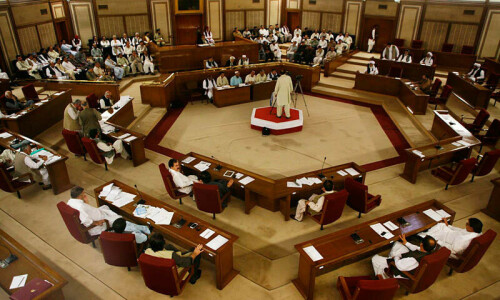
Pakistan’s banking benchmark statistics are somewhat of an anomaly. The country had an extremely high investment-to-deposit (IDR) ratio of 94pc in June 2024. However, its advance-to-deposit ratio (ADR) was at a measly 37pc in June.
Why? Because banks lend exorbitantly to the government. Financial institutions made record investments of Rs7.6tr during the year, mostly in risk-free and lucrative government papers and hence the high IDR.
Lending to the government left little space for the private sector, hence the low ADR, which measures the proportion of a bank’s total deposits that are given out as loans or advances. In simpler terms, how much of the money deposited into banks that is lent to customers.
A recent publication, “Road to Sustainability”, by PwC and AF Ferguson & Co, compares the banking sector’s benchmark indicators to peer countries. While other countries focus on lending to the private sector, in Pakistan, almost the entire pie is for the government. Of course, record high interest rates have also deterred businesses from borrowing.
Recently, the banks have started panicking. Banks need to have an ADR of a 50pc to prevent additional taxes. The new tax measures were to incentivise banks to lend more to the private sector and incidentally raise revenue for the government if they were unable to do so.
However, banks have found ways to thwart this. Banks are actively discouraging large deposits instead of lending to the private sector. Many banks have notified clients that they will charge a fee of up to 5pc on large deposits, such as Rs5bn, according to media sources. So, instead of increasing lending to the private sector, they are discouraging deposits.
All of this is easy money for one of the biggest corporate sectors in the country, which made money hand over fist during the economic crisis. Only 3pc of SMEs borrow from banks, and 75pc of farmers rely on informal sources of credit, according to the report. In contrast, India, Bangladesh, Sri Lanka and Kenya leverage the banking sector to finance the private sector. For example, regarding rural inclusion and, thus, access to credit for farmers, India and Kenya stands at 78pc and 74pc, respectively.
Indian billionaires and CEOs of global companies are often talked about with reverence. Having the Bollywood’s Khans dance at your son’s wedding takes really deep pockets, a feat that perhaps no Pakistani billionaire could achieve.
Encouraging entrepreneurship and businesses requires access to credit which the government has effectively sucked out of the market with its borrowings. Why would banks risk lending to businesses and individuals when they can enjoy the fruits of sovereign guarantees? While there is enormous potential for credit penetration, the financial sector has no appetite to lend.
Published in Dawn, The Business and Finance Weekly, November 25th, 2024















































Dear visitor, the comments section is undergoing an overhaul and will return soon.